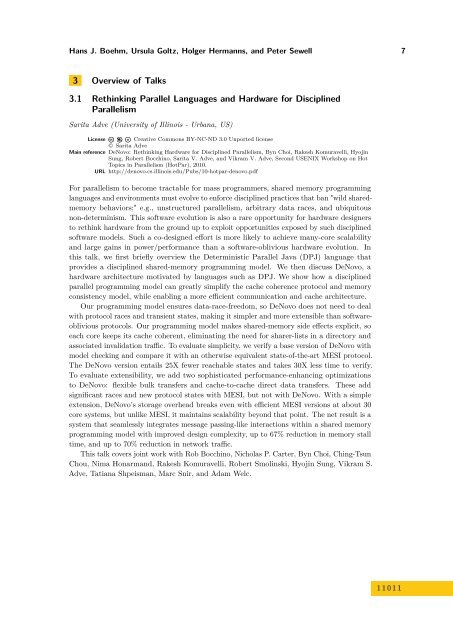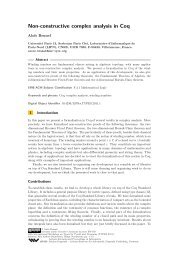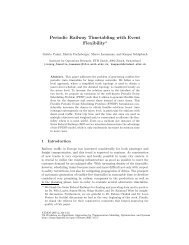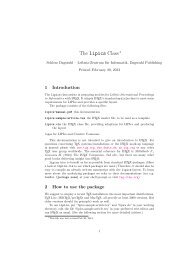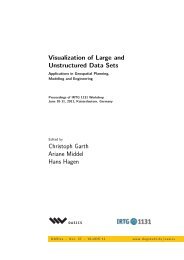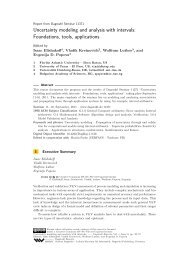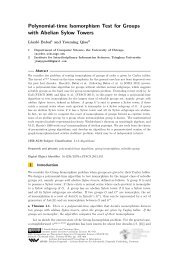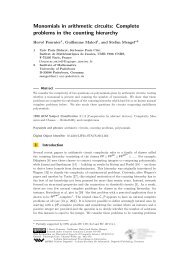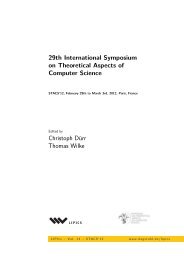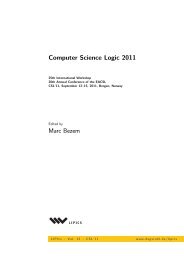Volume 1, Issue 1, January 2011 - DROPS - Schloss Dagstuhl
Volume 1, Issue 1, January 2011 - DROPS - Schloss Dagstuhl
Volume 1, Issue 1, January 2011 - DROPS - Schloss Dagstuhl
Create successful ePaper yourself
Turn your PDF publications into a flip-book with our unique Google optimized e-Paper software.
Hans J. Boehm, Ursula Goltz, Holger Hermanns, and Peter Sewell 7<br />
3 Overview of Talks<br />
3.1 Rethinking Parallel Languages and Hardware for Disciplined<br />
Parallelism<br />
Sarita Adve (University of Illinois - Urbana, US)<br />
License Creative Commons BY-NC-ND 3.0 Unported license<br />
© Sarita Adve<br />
Main reference DeNovo: Rethinking Hardware for Disciplined Parallelism, Byn Choi, Rakesh Komuravelli, Hyojin<br />
Sung, Robert Bocchino, Sarita V. Adve, and Vikram V. Adve, Second USENIX Workshop on Hot<br />
Topics in Parallelism (HotPar), 2010.<br />
URL http://denovo.cs.illinois.edu/Pubs/10-hotpar-denovo.pdf<br />
For parallelism to become tractable for mass programmers, shared memory programming<br />
languages and environments must evolve to enforce disciplined practices that ban "wild sharedmemory<br />
behaviors;" e.g., unstructured parallelism, arbitrary data races, and ubiquitous<br />
non-determinism. This software evolution is also a rare opportunity for hardware designers<br />
to rethink hardware from the ground up to exploit opportunities exposed by such disciplined<br />
software models. Such a co-designed effort is more likely to achieve many-core scalability<br />
and large gains in power/performance than a software-oblivious hardware evolution. In<br />
this talk, we first briefly overview the Deterministic Parallel Java (DPJ) language that<br />
provides a disciplined shared-memory programming model. We then discuss DeNovo, a<br />
hardware architecture motivated by languages such as DPJ. We show how a disciplined<br />
parallel programming model can greatly simplify the cache coherence protocol and memory<br />
consistency model, while enabling a more efficient communication and cache architecture.<br />
Our programming model ensures data-race-freedom, so DeNovo does not need to deal<br />
with protocol races and transient states, making it simpler and more extensible than softwareoblivious<br />
protocols. Our programming model makes shared-memory side effects explicit, so<br />
each core keeps its cache coherent, eliminating the need for sharer-lists in a directory and<br />
associated invalidation traffic. To evaluate simplicity, we verify a base version of DeNovo with<br />
model checking and compare it with an otherwise equivalent state-of-the-art MESI protocol.<br />
The DeNovo version entails 25X fewer reachable states and takes 30X less time to verify.<br />
To evaluate extensibility, we add two sophisticated performance-enhancing optimizations<br />
to DeNovo: flexible bulk transfers and cache-to-cache direct data transfers. These add<br />
significant races and new protocol states with MESI, but not with DeNovo. With a simple<br />
extension, DeNovo’s storage overhead breaks even with efficient MESI versions at about 30<br />
core systems, but unlike MESI, it maintains scalability beyond that point. The net result is a<br />
system that seamlessly integrates message passing-like interactions within a shared memory<br />
programming model with improved design complexity, up to 67% reduction in memory stall<br />
time, and up to 70% reduction in network traffic.<br />
This talk covers joint work with Rob Bocchino, Nicholas P. Carter, Byn Choi, Ching-Tsun<br />
Chou, Nima Honarmand, Rakesh Komuravelli, Robert Smolinski, Hyojin Sung, Vikram S.<br />
Adve, Tatiana Shpeisman, Marc Snir, and Adam Welc.<br />
1 1 0 1 1


